Financial Literacy for Physicians: Blogs, Books, and Podcasts to Teach You the Basics

Learning how to manage student loans, invest, and budget is likely at the bottom of your to-do list while balancing your responsibilities as a resident. It’s true that many young doctors are so preoccupied with getting through training that they don’t take the time to learn basic personal finance—however, progression through medical training is inextricably linked to your financial life, and shouldn’t be ignored!
The financial decisions you make early in your medical career have a profound impact on life milestones such as purchasing a home or retiring. To help you navigate your finances at this crucial time in your career, we’ll discuss the basics of financial literacy in this post, as well as some recommended resources to make the “financial learning curve” less steep.
Why Personal Finance Is So Unique for Physicians
The financial trajectory of early career physicians is unlike that of any other young professional.
Doctors take on enormous debt in their early 20s and then make zero income during their four years of medical school. They’ll finally start to earn an income during residency, but their resident salary is not typically conducive to saving, investing, or loan repayment (and unfortunately, nowhere near commensurate with their level of education).
This process of medical school plus residency takes a minimum of seven years (well done pediatrics, family, and internal medicine) but can last up to eleven (looking at you, neurosurgery). It can be tough to graduate college at 22 and not make an “attending paycheck” until you’re 29 (at the earliest).
Then suddenly this period ends, and residents become attendings. Their first paycheck is now five times what they made as a resident just a few months before! So the question is now, what do you do with it?
The Trap of Lifestyle Inflation
This asymptotic rise in earnings can lead to something called “lifestyle inflation,” as newly minted attendings rush to cash in their new big paychecks on long-awaited fancy cars, big houses, or deluxe vacations. They’re also straddled with high debt loads and have saved almost nothing for retirement throughout their 20s.
Without some basic financial literacy, this can be the perfect storm for a physician who makes a multiple six-figure income and yet lives paycheck to paycheck.
But enough of the dark side of physician finance! Let’s discuss why physicians are well-poised for financial success (even if they make some mistakes along the way) and then dive into what books, podcasts, and blogs can get you on the right track from the start.
The Good News About Early Career Financial Mistakes
Even if physicians mismanage their money at the beginning of their career, they are still well-equipped to right the ship. After all, doctors are in the top 1-5% of earners across the country.
As the saying goes, you may dig a big hole, but with that comes a “big shovel.” For example, a physician making 300k who got into financial trouble early on can scale back and live quite comfortably on 80k for a few years while using the difference to get back on track. (After all, they lived through residency on much less!) This requires some sacrifice and is “easier said than done,” but it’s hardly comparable to climbing out of a hole with a 100k-sized shovel.
It should also be said that physicians are in high demand and have widely applicable skills in a clinical setting, as consultants or government advisors, for pharmaceutical companies, or as research leads. This means physicians likely won’t experience long stretches of unemployment and can pivot to different roles as their interests or schedules change throughout their career.
Physicians also tend to retire later than other workers on average (hopefully this is a reflection of enjoying their work and purpose, rather than not having enough saved for retirement). They can often transition into retirement over many years by scaling back to part-time clinic work, consulting gigs, administrative work, or teaching.
No matter where you are in your medical journey, we’re here to help. Find a Rosh Review Qbank that’s right for you from ITEs through boards, recertification, and beyond.
The Best Blogs, Books, and Podcasts for Physician-Specific Financial Advice!
A handful of entrepreneurial doctors have recognized the unique financial situation of physicians (and the dearth of advice and support for this population) as an untapped industry. You should take any online advice with a grain of salt and always consider the unique aspects of your financial situation.
That said, spending time learning what these savvy physician investors have to say will help you make the most of your lifelong investment in medicine. Keep reading to find out my top recommendations for getting solid, physician-specific financial advice!
1. Ryan Inman
Let’s start with Ryan Inman, who was my introduction to the world of personal finance for physicians. He trained in business and personal finance rather than medicine, but his wife is a Navy physician so he has a unique perspective.
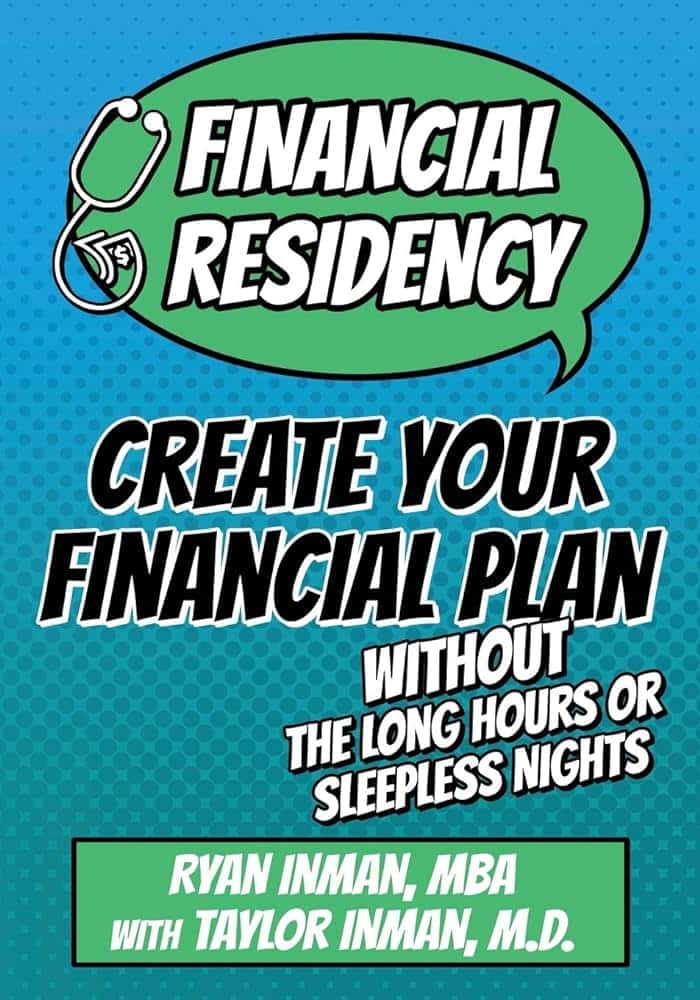
Book: Financial Residency: Create Your Financial Plan Without the Long Hours or Sleepless Nights
I enjoyed his book, Financial Residency: Create Your Financial Plan Without the Long Hours or Sleepless Nights. It’s written at a very basic level and in a workbook style with places for you to fill in your budget, financial goals, and perceived challenges.
Further, it covers all the basics at a medical student/resident level, including:
- Making a budget
- Managing debt (medical school, credit card, and otherwise)
- Purchasing insurance (especially disability insurance, a common oversight for young physicians)
- Basics of home ownership
I appreciate that the book is very oriented toward prioritizing your personal goals and taking concrete steps to get there. It’s straightforward and friendly, with zero intimidation. This is a great place to start!
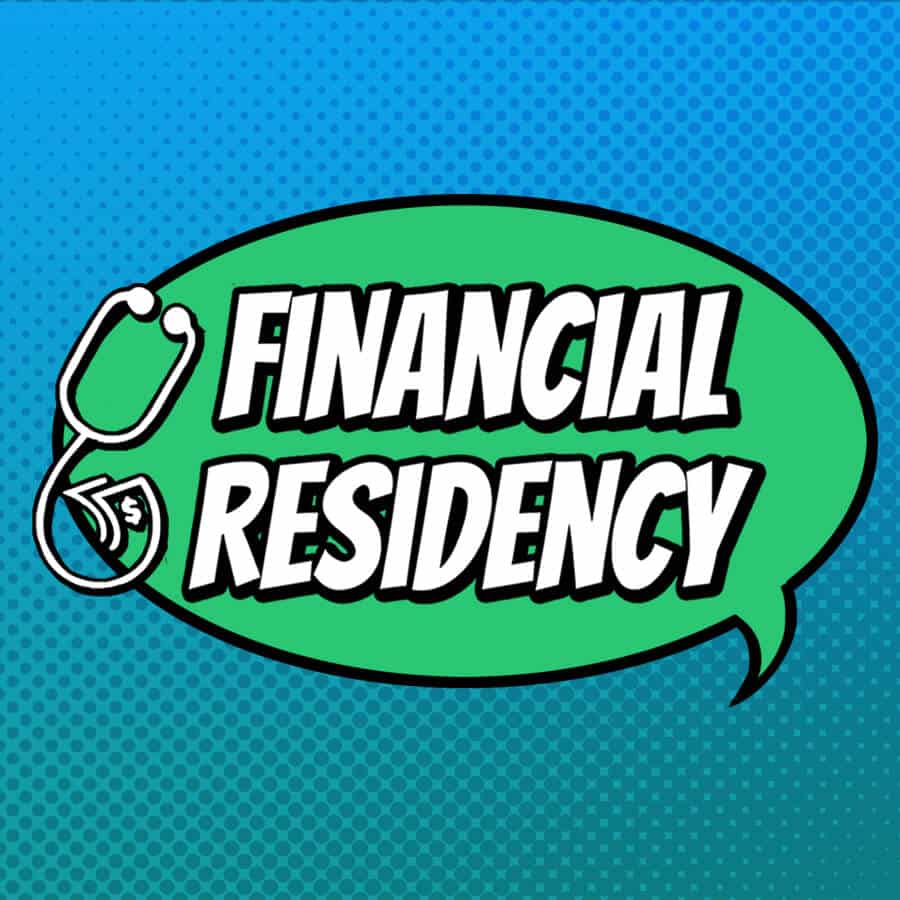
Podcast: “Financial Residency”
While you’re waiting for your copy to arrive in the mail, I recommend listening to his podcasts, which cover the same topics in a more detailed but approachable way. “Financial Residency” is a personal favorite.
Some of my favorite episodes to start with include:
- “Avoiding Lifestyle Creep”
- “The Science Behind Positive Financial Habits”
- “How to Build a Budget That Actually Makes Sense”
- “Physician Contract Review Mistakes Newbies Make”
- “Top Mistakes You See Physicians Making With Their Loans”
- “What’s Up With Student Debt and PSLF”
- “Top 5 Physician Finance Money Lessons”
- “Curbside Consult: What To Look for in the Transition From Residency to an Attending”
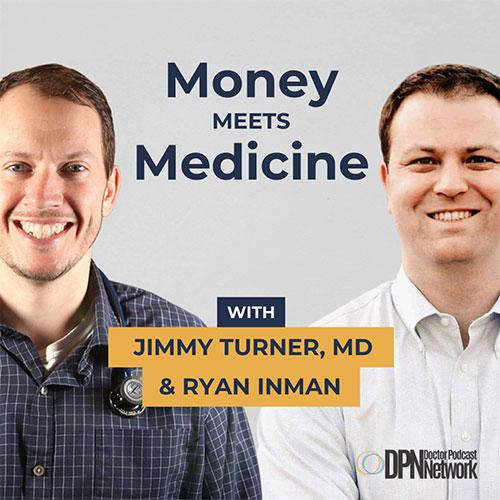
Podcast: “Money Meets Medicine (MMM)”
A similar podcast I recommend is called “Money Meets Medicine (MMM).” This podcast is a joint production between Ryan Inman and Dr. Jimmy Turner, a practicing anesthesiologist who we’ll dive into in the next section and is well read in personal finance.
Here are my top episodes:
- “The Top Financial Rules for Residents and Fellows” (highly recommended)
- “How to Avoid the Voldemort of Disability Insurance”
- “Why There Is no Such Thing as a Dream Home”
- “The Dangers of the Monthly Payment Mindset”
- “This Is What Made Warren Buffett Rich”
- “How Financial Dependence Retire Early Can Burn You”
- “Why Doctors Should Spend Money”
- “Must-Do Financial Checklists for Doctors (Parts 1 and 2)”
2. Dr. Jimmy Turner
I enjoy Dr. Turner’s work because it acknowledges the “delayed gratification” experience of medical training and doesn’t downplay how difficult this is. Rather than judge new attendings for wanting to enjoy their decade-in-the-making paycheck, he’s a strong proponent of physicians spending money on things that make them happy.
He’s a self-proclaimed “car guy” and a big fan of golf, so he acknowledges that he spends money on what more austere writers in the physician blogosphere might call “frivolous items” or hobbies that are too expensive.
But, he reasonably argues that people should invest in what makes them happy, provided they’re hitting all of the other important financial milestones like saving for retirement, paying back loans, etc. He argues that car people can buy fancy cars, house people can buy nice houses, and vacation people can splurge on deluxe travel, but few physicians can have all of these things and also cover their other financial obligations.
Overall, his work centers around challenging you to decide what’s important to you and having the discipline to say no to everything else that might inflate your lifestyle.
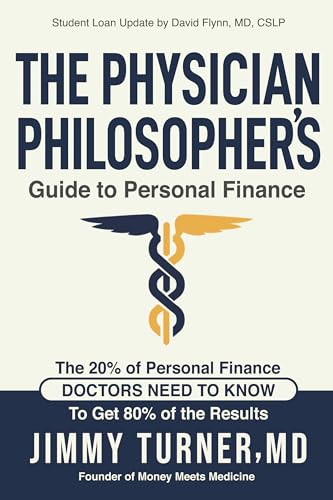
Book: The Physician Philosopher’s Guide to Personal Finance
I enjoyed Dr. Turner’s book, The Physician Philosopher’s Guide to Personal Finance. As the subject suggests, it digs a bit more into the psychology behind personal finance and the unique physician experience.
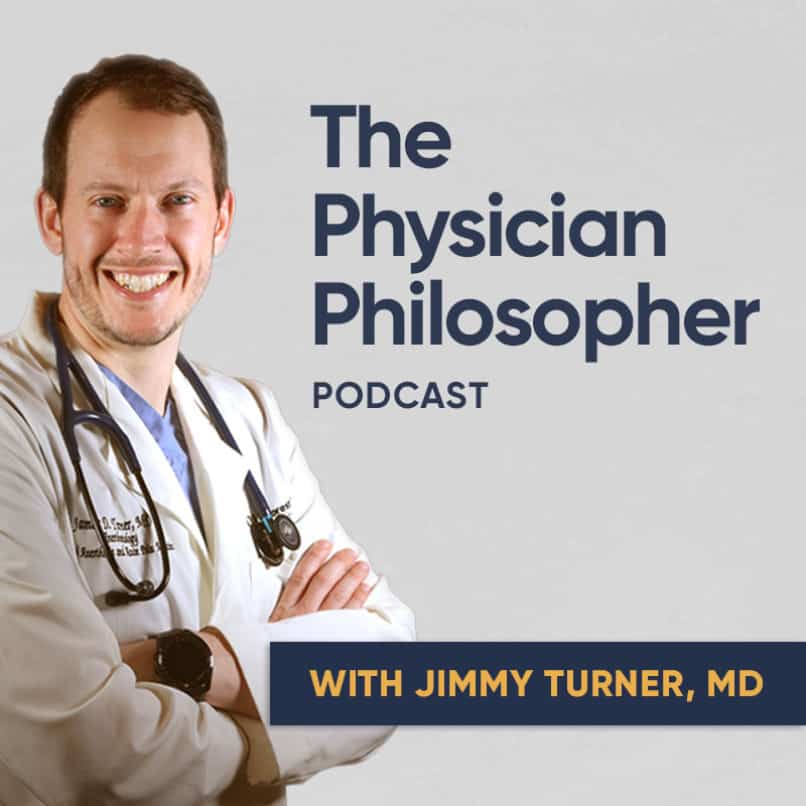
Podcast: “The Physician Philosopher”
Dr. Turner also runs a well-known website and podcast by the same name. Here are my top episodes from the “Physician Philosopher” podcast:
- “The Arrival Fallacy” (my all-time favorite episode!)
- “YOLO Versus FIRE”
- “Building a Hell Yes Policy”
- “How to Have a Healthy Money Mindset”
- “Mastering Your Money”
- “Common Money Mindset Mistakes Physicians Make”
- “Money Is the Great Amplifier”
- “The Art and Importance of Saying No”
3. Dr. Jim Dahle
I’d be remiss if I didn’t mention “The White Coat Investor” in this discussion of physician finance. It’s the juggernaut in the industry, in part because its founder Dr. Jim Dahle was the first to carve out a slice of the personal finance world and dedicate it to medical professionals.
Dr. Dahle is an emergency medicine trained physician (still practicing despite a wildly successful company) and former Navy doc. He started out as a blogger and has grown the business into a popular website, forum, book series, YouTube channel, and podcast…you name it, and he’s on it. His company also runs a yearly conference revolving around physician personal finance and wellness.
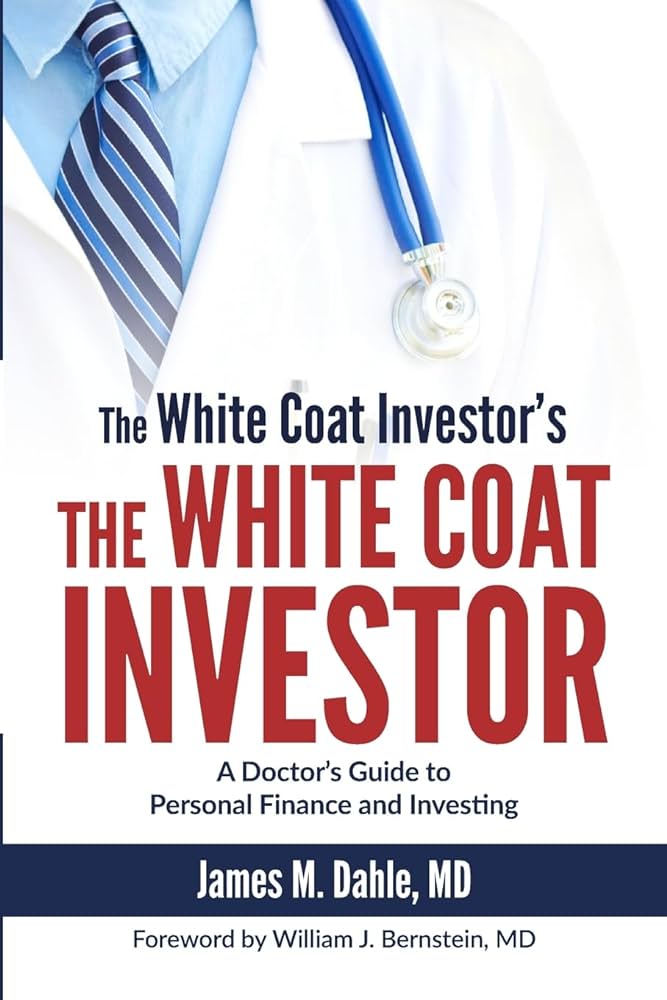
Book: The White Coat Investor
Dr. Dahle’s universe is so far-reaching it can be hard to know where to start. I’d recommend his books, particularly the original The White Coat Investor. I’ve also heard great things about the guide for students.
He has several core tenants in the book, including “living like a resident” the first few years into attending-hood while aggressively paying back loans, “geographic arbitrage,” i.e., moving to places with low cost of living and high salaries, resisting the temptation to buy property as a resident, and catching up on retirement savings by dedicating 25% of your income to such accounts.
I find his recommendations fall a bit more on the strict spectrum, and this can be a turnoff for some people, but the overarching themes of saving aggressively and living well below your means are excellent tenants to live by.
Over the years, he’s published more and more advanced material on taxes, investment strategies, and other topics beyond the purview of most medical students/residents, but he has advice you can grow into over time.
Podcasts: “The White Coat Investor” and “Milestones to Millionaires”
You can peruse episodes of “The White Coat Investor” podcast to find relatable topics and go from there. I also enjoy his “Milestones to Millionaires” podcast, which is a show where listeners call in to share their financial successes and inspire others on the same path.
4. Dr. Leif Dahleen
Dr. Leif Dahleen is an anesthesiologist who achieved financial independence at age 39 and ultimately retired at age 43, inspiring him to found “Physician on FIRE” to help other physicians do the same.
FIRE stands for “financial independence, retire early.”
The “financial independence” (FI) part of FIRE refers to saving enough money that you can afford not to earn another cent in your lifetime. You no longer have any debt (mortgage, car loan, student loans) and you have a sizable nest egg to draw from to sustain yourself. You don’t need to pay for disability insurance because if you got hurt on the job you wouldn’t need an insurance check to sustain you.
It means you’re ready to retire, but usually refers to someone that’s much younger than the typical “retirement age” (perhaps in their 40s or 50s). Even when people reach this amazing milestone, not everyone retires immediately (the “RE” part of “FIRE”).
Many people continue working because they enjoy their jobs in medicine and derive purpose from them. But knowing you don’t have to work allows you to say “no” to things that detract from your work happiness, like taking night/weekend calls or administrative duties.
Ultimately, I think there are a lot of great things about the FIRE mindset, but there can be some drawbacks to having such aggressive retirement goals. Some physicians take this to the extreme at the expense of their current happiness or find retiring in middle age to be less fulfilling than they’d envisioned.

Blog: “Physician on FIRE”
You can peruse Dr. Dahleen’s blog, “Physician on FIRE,”and draw your own conclusions about how this strategy may or may not fit into your ultimate life goals.
I’m drawing attention to his work mostly because he wrote one of my all-time favorite blog posts called “The Tale of Four Physicians: The Impact of Lifestyle on Financial Independence.” He lays out four physicians with equal income but with vastly different spending habits, doctors A (the most frugal), B, C, and D (the ultimate spendthrift). He includes tables that lay out their budgets and how this translates to their financial situation.
Eventually, you learn that Dr. A lived so modestly she could retire within 13 to 17 years after finishing residency (the gap is attributed to whether she gets a 2% or 6% return on her retirement investments). Dr. D on the other hand could retire between 48 and 94 years from his first attending paycheck—yikes!
The point is that Dr. D may live lavishly, but he’s living paycheck to paycheck, will have to keep working indefinitely, and is very dependent on highly fluctuant market returns. The takeaway from this article for me is that these physicians all got the same paycheck, but it was their savings rate that determined their financial success. This is great news! It means that you’re in control of your financial future.
It’s helpful to read the article and find where you fit in the A to D scale. Personally, I’m more like a Dr. B: pretty frugal, but also wanting to upgrade my lifestyle a bit from residency. See where you fit in the spectrum and if your habits fit your ultimate financial goals.
(Dahleen also wrote a related article called “A Tale of Four Single Primary Care Physicians,” which uses a lower salary but also lower expenses than the first. Interestingly, the retirement ages work out to about the same. It just goes to show that lower income can still translate into a great financial life as long as saving is prioritized.)
5. Additional Books
If you’re more of a book person, I can recommend a few in addition to those I discussed above.
The Bogleheads Guide to Investing is a great start to investing and is very popular in the mainstream (it’s not physician-specific).
The Millionaire Next Door is another classic and gets into some of the psychology of wealth-building.
I haven’t read Dr. Ben White’s Dealing with Student Loans but I’ve heard great things about it.
Dr. Dahle of “The White Coat Investor” also has a nice list of books on his website, sorted by doctor-specific, personal finance, investing, taxes, and the like.
Final Thoughts
It can be hard to dedicate time and energy to personal finance when you have so many other challenges to confront during your medical training. I recommend starting slowly. Listen to a podcast here or there, and commit to reading a few financial books a year.
The most pressing financial matters you have as an early career physician are managing a budget and dealing with student loans, so seek out those resources first and write down your own financial plan. Hopefully, these resources will help you feel less alone in the strange financial life of a young doctor, and equip you with the tools you need to succeed!
Looking for more (free!) tips for residents? Check out these other posts on the Rosh Review blog:
- Managing Your Finances During Residency: A Physician’s Guide
- A Resident’s Guide to Restarting Your Student Loan Payments
- 5 Best Mobile Apps for Medical Residents
Rosh Review is a board review company providing Qbanks that boost your confidence for your boards and beyond. Get started with a Rosh Review free trial to the Qbank of your choice, no credit card required! Gain access to board-style practice questions, detailed explanations, beautiful medical images, and more.





Comments (0)